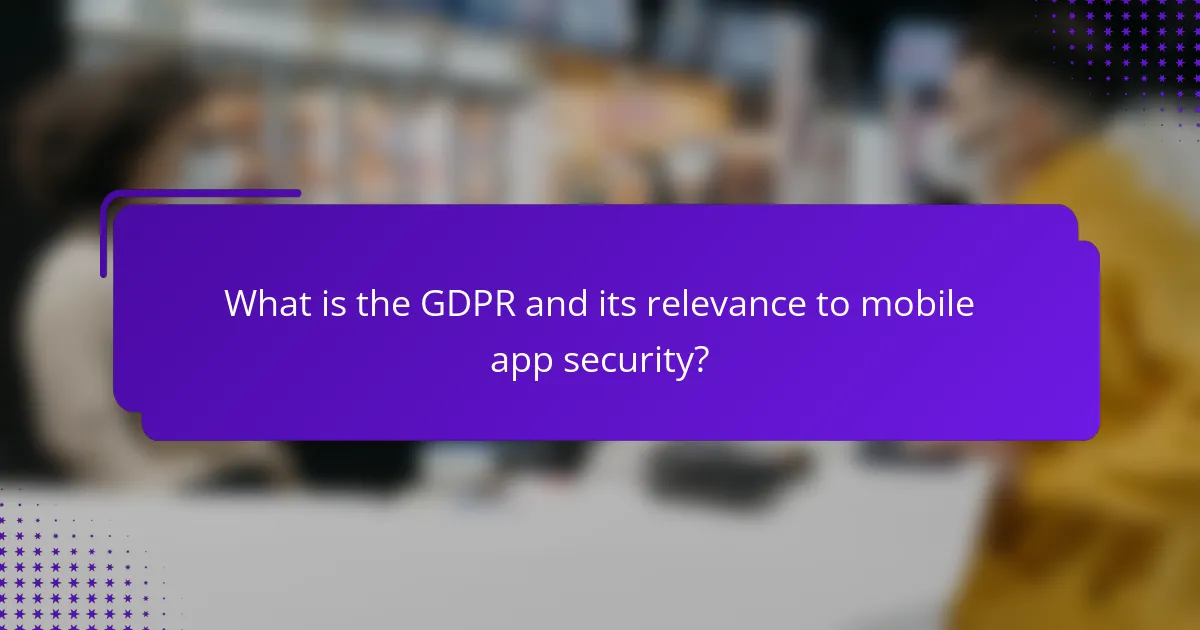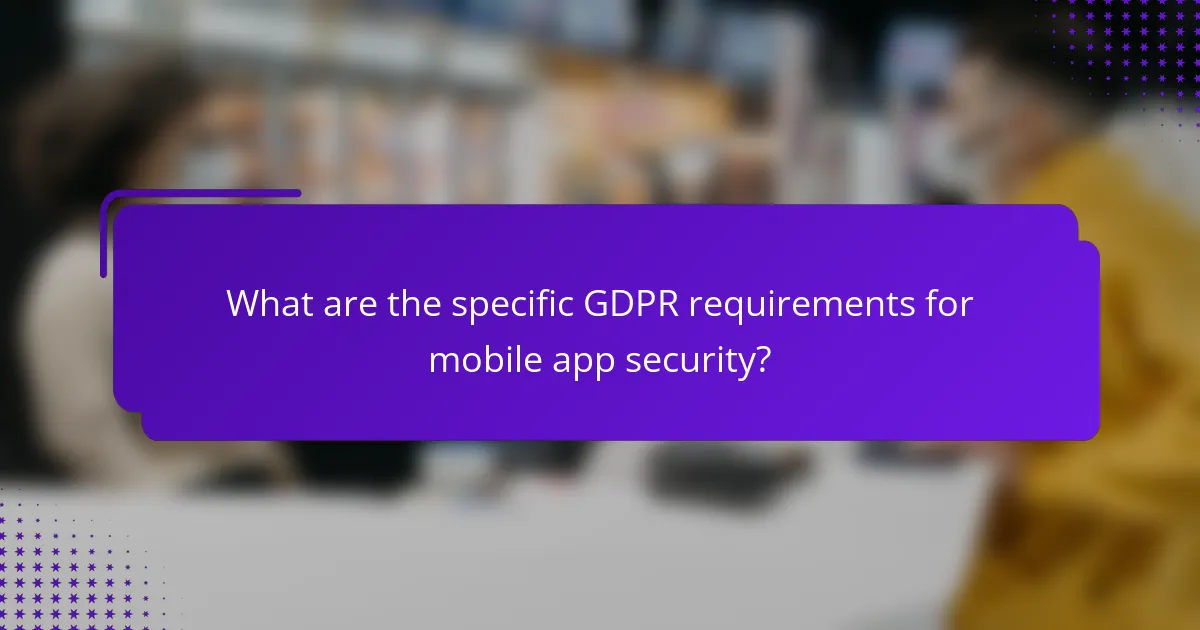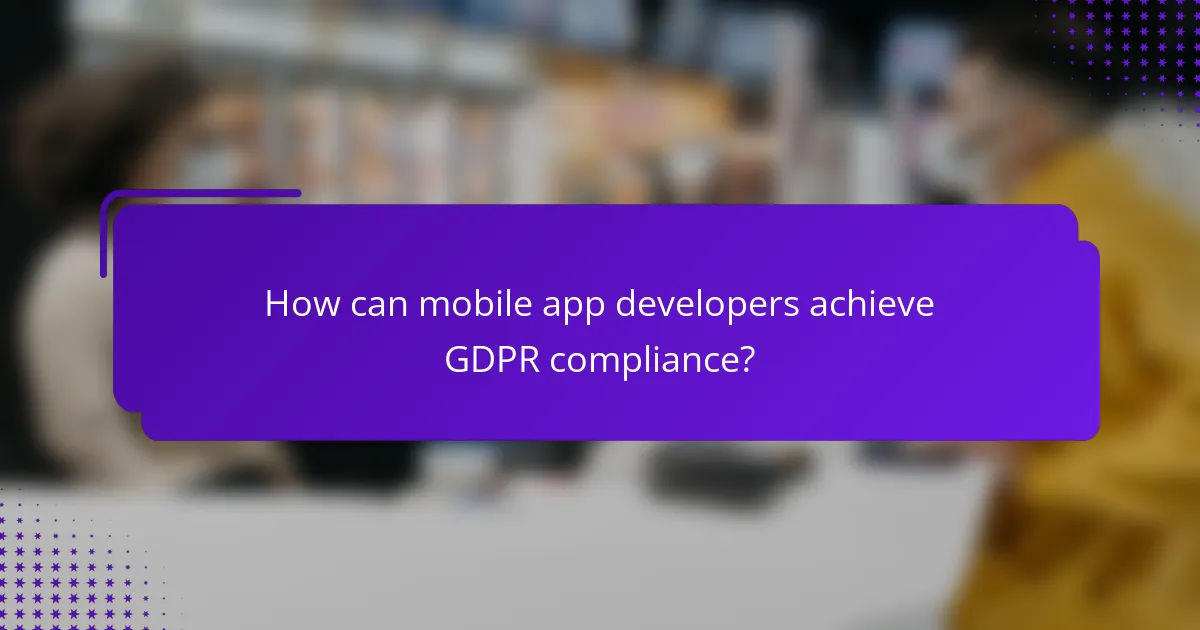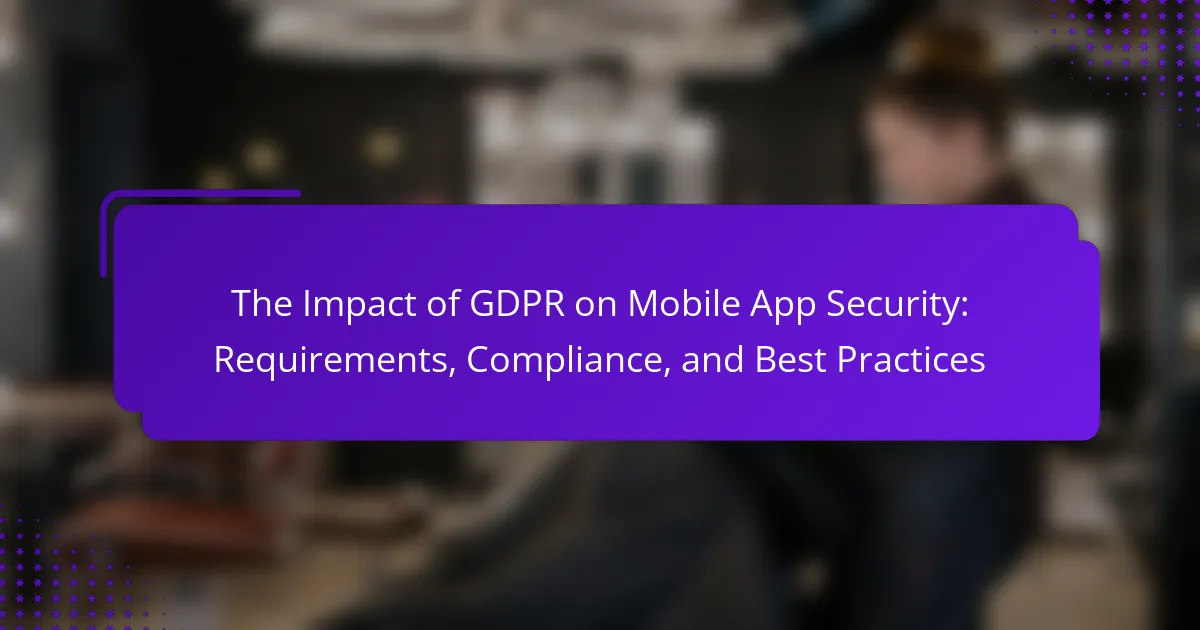The General Data Protection Regulation (GDPR) is a key data protection law in the European Union that sets strict guidelines for the collection and processing of personal data. This regulation significantly impacts mobile app security, requiring developers to implement robust security measures such as data encryption, user consent management, and secure data storage. Compliance with GDPR is essential for mobile applications to protect user data and maintain user trust, as non-compliance can lead to substantial fines. The article outlines the specific requirements for GDPR compliance, including data minimization, regular security assessments, and clear data breach notification procedures, providing best practices for mobile app developers to ensure adherence to these regulations.

What is the GDPR and its relevance to mobile app security?
The General Data Protection Regulation (GDPR) is a comprehensive data protection law in the European Union. It establishes guidelines for the collection and processing of personal information. GDPR is relevant to mobile app security as it mandates strict data protection measures. Mobile apps must ensure user data is collected, stored, and processed securely. Non-compliance with GDPR can result in significant fines, up to 4% of annual global revenue. This regulation compels app developers to implement robust security practices. These practices include data encryption, user consent management, and regular security audits. Ensuring compliance with GDPR not only protects user data but also enhances user trust in mobile applications.
How does the GDPR define personal data?
Personal data is defined by the GDPR as any information relating to an identified or identifiable natural person. This includes names, identification numbers, location data, and online identifiers. The regulation emphasizes that personal data can be directly or indirectly linked to an individual. The GDPR’s Article 4(1) specifically outlines this definition. It establishes a broad scope, covering various forms of data that can identify a person. This definition underpins the regulation’s requirements for data protection and privacy.
What types of data are considered personal under the GDPR?
Personal data under the GDPR includes any information that relates to an identified or identifiable individual. This can encompass names, identification numbers, location data, and online identifiers. It also includes characteristics such as physical, physiological, genetic, mental, economic, cultural, or social identity. Additionally, sensitive personal data, like racial or ethnic origin, political opinions, and health information, are also protected. The GDPR defines personal data broadly to ensure comprehensive protection.
Why is personal data protection crucial for mobile apps?
Personal data protection is crucial for mobile apps to safeguard user privacy and security. Mobile apps often collect sensitive information, including location data, contact details, and payment information. According to a 2021 report by the International Association of Privacy Professionals, 79% of consumers express concerns about their data privacy when using mobile applications.
Failure to protect personal data can lead to data breaches, resulting in financial loss and reputational damage for companies. The General Data Protection Regulation (GDPR) mandates strict guidelines for data handling, ensuring users have control over their personal information. Non-compliance can result in hefty fines, reaching up to 4% of a company’s annual revenue.
Thus, implementing robust data protection measures is not only a legal requirement but also essential for maintaining user trust and loyalty.
What are the key principles of the GDPR?
The key principles of the GDPR include data protection by design and by default, lawful processing, transparency, purpose limitation, data minimization, accuracy, storage limitation, integrity and confidentiality, and accountability. Data protection by design and by default requires organizations to integrate data protection measures into their processing activities. Lawful processing mandates that personal data must be processed legally, fairly, and transparently. Transparency obligates organizations to inform individuals about how their data is used. Purpose limitation states that data should only be collected for specified, legitimate purposes. Data minimization requires that only necessary data is collected. Accuracy emphasizes that personal data must be accurate and kept up to date. Storage limitation restricts data retention to a necessary duration. Integrity and confidentiality ensure that personal data is protected against unauthorized access. Accountability requires organizations to demonstrate compliance with these principles. These principles are foundational to the GDPR and guide organizations in their handling of personal data.
How do these principles apply to mobile app developers?
The principles of GDPR apply to mobile app developers by mandating data protection and user privacy. Developers must ensure that personal data is processed lawfully, transparently, and for specific purposes. They are required to obtain explicit consent from users before collecting their data. Additionally, developers must implement appropriate security measures to protect user data from breaches. This includes encryption and regular security assessments. Non-compliance can result in significant fines, which emphasize the importance of adhering to GDPR. According to the European Commission, GDPR fines can reach up to 4% of annual global turnover or €20 million, whichever is higher.
What responsibilities do app developers have under the GDPR?
App developers must ensure compliance with GDPR by implementing data protection measures. They are responsible for obtaining explicit consent from users before collecting personal data. Developers must provide clear privacy notices detailing data usage. They must also implement data security measures to protect user information. Additionally, developers should enable users to access, rectify, or delete their data. They are required to report data breaches to authorities within 72 hours. Developers must also conduct Data Protection Impact Assessments (DPIAs) when necessary. These responsibilities are essential to avoid penalties and maintain user trust.

What are the specific GDPR requirements for mobile app security?
GDPR requires mobile apps to implement appropriate security measures to protect personal data. These measures include encryption, pseudonymization, and secure data storage. Mobile apps must also ensure that data is processed securely during transmission. Regular security assessments and testing are mandated to identify vulnerabilities. Furthermore, apps must have clear data breach notification procedures in place. User consent must be obtained before processing personal data, and users should be able to access and delete their data. These requirements are designed to enhance user privacy and data protection. Compliance with GDPR is enforced by regulatory authorities, which can impose fines for non-compliance.
How can mobile apps ensure data protection by design?
Mobile apps can ensure data protection by design through implementing privacy by design principles. This involves integrating data protection measures into the app’s development process from the outset. Developers should conduct data protection impact assessments to identify risks early. They must also minimize data collection to only what is necessary for functionality.
Encryption techniques should be employed to secure data both in transit and at rest. Access controls must be established to limit data access to authorized users only. Regular security updates and patches are essential to address vulnerabilities. Transparency to users about data usage and obtaining informed consent is crucial under GDPR.
Research shows that apps adhering to these principles significantly reduce data breaches and enhance user trust. According to the GDPR guidelines, incorporating these practices is not just beneficial but legally required for compliance.
What measures can be implemented during app development?
Implementing measures during app development is essential for GDPR compliance. First, conduct a thorough data protection impact assessment (DPIA). This identifies risks related to personal data processing. Next, ensure data minimization by collecting only necessary information. Use encryption for data at rest and in transit to protect user privacy. Implement strong access controls to limit who can access personal data. Regularly update and patch the app to address security vulnerabilities. Additionally, provide clear privacy notices to inform users about data usage. Finally, establish a process for handling data subject requests efficiently. These measures collectively enhance security and ensure compliance with GDPR regulations.
How does encryption play a role in data protection?
Encryption secures data by converting it into a coded format that is unreadable without a decryption key. This process protects sensitive information from unauthorized access. For instance, encryption is essential for safeguarding personal data as mandated by GDPR. Under GDPR, organizations must implement appropriate security measures, including encryption, to protect user data. Studies show that encrypted data breaches are less damaging than unencrypted breaches. Encryption also aids in maintaining data integrity and confidentiality during transmission. Thus, encryption plays a critical role in ensuring compliance with data protection regulations like GDPR.
What are the requirements for user consent under the GDPR?
User consent under the GDPR must be informed, specific, unambiguous, and freely given. The consent must be clear, indicating the individual’s agreement to the processing of their personal data. Users should understand what they are consenting to, including the purpose of data processing. Consent requests must be separate from other agreements and presented in an intelligible and easily accessible form. Users have the right to withdraw consent at any time. Organizations must keep records of consent to demonstrate compliance. The GDPR mandates that consent must not be a precondition for service unless necessary for that service.
How should consent be obtained and documented?
Consent should be obtained through clear and affirmative actions from users. This involves providing users with detailed information about data processing activities. Users must have the option to agree or refuse consent freely. Documentation of consent should include the date, time, and method of consent acquisition. It is essential to keep records of what users were informed about. Additionally, organizations should maintain a log of consent withdrawals. This aligns with GDPR requirements for transparency and accountability. Properly documented consent supports compliance audits and user trust.
What are the implications of failing to obtain proper consent?
Failing to obtain proper consent can lead to significant legal consequences. Organizations may face fines up to €20 million or 4% of annual global revenue under GDPR. This non-compliance can also result in reputational damage. Trust with users can erode, impacting user retention and acquisition. Legal actions from affected individuals can arise, leading to costly litigation. Data breaches may be more likely, as improper consent processes can indicate lax security measures. Additionally, organizations may be forced to halt data processing activities until compliance is achieved.

How can mobile app developers achieve GDPR compliance?
Mobile app developers can achieve GDPR compliance by implementing specific data protection measures. They must ensure user consent is obtained before collecting personal data. This consent should be clear, informed, and revocable. Developers must also provide users with access to their data and the ability to request its deletion.
Data minimization is essential; only necessary data should be collected. Additionally, developers should implement strong security measures to protect personal data from breaches. Regular audits and assessments of data processing activities are necessary to maintain compliance.
Documentation of data processing activities is also required under GDPR. Developers must be prepared to demonstrate compliance to regulatory authorities. Following these steps will help mobile app developers align with GDPR requirements effectively.
What steps should be taken for compliance assessment?
Identify applicable regulations and requirements. Understand the specific provisions of GDPR relevant to mobile apps. Conduct a gap analysis to compare current practices against GDPR standards. Document existing data handling processes and security measures. Engage stakeholders to gather insights on compliance readiness. Develop an action plan to address identified gaps. Implement necessary changes to ensure compliance. Monitor ongoing compliance and conduct regular assessments to adapt to regulatory changes.
How can developers conduct a Data Protection Impact Assessment (DPIA)?
Developers can conduct a Data Protection Impact Assessment (DPIA) by following a structured process. First, they need to identify the data processing activities involved in their project. Next, they should assess the necessity and proportionality of the processing in relation to its purpose. Developers must then evaluate the risks to individuals’ rights and freedoms. This includes considering potential impacts from data breaches or misuse.
After identifying risks, they should determine measures to mitigate these risks. These measures may include data encryption or access controls. Developers must document their findings and decisions throughout the DPIA process. Finally, they should consult with relevant stakeholders, including data protection officers, to ensure compliance with GDPR requirements. This structured approach aligns with guidelines provided by the European Data Protection Board.
What tools and resources are available for compliance tracking?
Compliance tracking tools include software solutions and resources designed to ensure adherence to regulations. Popular tools are compliance management systems like TrustArc and OneTrust. These platforms help organizations monitor compliance with GDPR and other regulations. They provide features such as risk assessments, documentation management, and reporting capabilities. Additionally, resources like the GDPR official website offer guidelines and updates on compliance requirements. Industry-specific compliance tools may also be available, tailored to unique sector needs. Regular audits and training programs are vital resources for maintaining compliance.
What are the best practices for maintaining compliance over time?
Regularly review and update compliance policies to reflect changes in regulations. Conduct training sessions for staff to ensure understanding of compliance requirements. Implement a compliance monitoring system to track adherence to policies. Document all compliance-related processes and decisions for transparency. Engage with legal experts to interpret and apply GDPR requirements correctly. Perform regular audits to identify and rectify compliance gaps. Maintain open communication with stakeholders about compliance practices. Utilize technology solutions to automate compliance tasks and reduce human error.
How can regular audits support ongoing compliance?
Regular audits support ongoing compliance by systematically reviewing processes and practices. They identify potential gaps in adherence to regulations. This proactive approach ensures that organizations remain aligned with GDPR requirements. Regular audits can uncover areas needing improvement or adjustments. They provide an opportunity for timely corrective actions. Furthermore, audits help establish a culture of accountability within organizations. Consistent monitoring reinforces compliance as laws and regulations evolve. Evidence from compliance studies shows that organizations conducting regular audits experience fewer compliance violations.
What role does user feedback play in compliance maintenance?
User feedback is crucial for compliance maintenance. It helps organizations identify gaps in their adherence to regulations. Regular feedback allows companies to adjust practices based on user experiences. This is particularly important under GDPR, which mandates transparency and user rights. Feedback mechanisms can highlight areas needing improvement, such as data handling processes. Additionally, user insights can guide the development of privacy policies. Engaging users fosters trust and enhances compliance efforts. Overall, user feedback serves as a valuable tool for ongoing compliance evaluation and enhancement.
What practical tips can mobile app developers follow for GDPR compliance?
Mobile app developers can ensure GDPR compliance by implementing several practical tips. First, they must obtain explicit consent from users before collecting personal data. This means providing clear information on what data is being collected and its purpose. Second, developers should implement data minimization practices. Only collect data that is necessary for the app’s functionality. Third, they must provide users with the ability to access, correct, and delete their personal data. This aligns with users’ rights under GDPR. Fourth, developers should ensure robust data security measures are in place. This includes encryption and secure data storage practices. Finally, they need to maintain detailed records of data processing activities. This documentation is essential for demonstrating compliance during audits. These practices collectively help mobile app developers meet GDPR requirements effectively.
The main entity of this article is the General Data Protection Regulation (GDPR) and its implications for mobile app security. The article outlines the key requirements for GDPR compliance, including the definition of personal data, the importance of user consent, and the principles that mobile app developers must adhere to in order to protect user information. It emphasizes the necessity of implementing robust security measures such as encryption and data minimization, while also detailing the responsibilities of developers in ensuring compliance. Additionally, the article discusses best practices and tools for maintaining ongoing compliance with GDPR regulations, highlighting the significance of user feedback and regular audits in the process.
